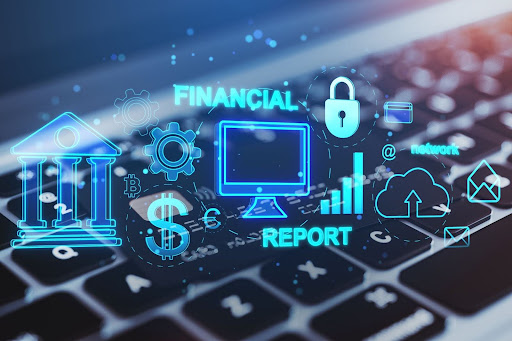Did you know that 58% of cyberattacks are aimed at small businesses, with accounting firms being top targets? Imagine waking up to find your personal financial data stolen—how would that impact your life? Accounting firms handle sensitive information for countless clients, making them prime targets for cybercriminals.
The risks? Identity theft, financial loss, and shattered reputations. As technology evolves, so do the threats. This blog at LUCI Financial Solutions will explore why cybersecurity is crucial for accounting firms, revealing unique insights and practical solutions to keep financial data safe.
Ready to learn how to protect your business? Keep reading to find out.
Understanding Cybersecurity in Accounting
Cybersecurity might sound complex, but it’s all about keeping our digital information safe. For accounting firms, this means protecting sensitive financial data from falling into the wrong hands. In this section, we’ll dive into what cybersecurity means, how it shields accounting data, and the common threats that accounting firms face.
Have you ever wondered what happens when hackers target accounting firms? Keep reading to find out how these risks can be managed.
Definition & Scope of Cybersecurity
Cybersecurity is the practice of protecting computers, networks, and data from digital attacks. In simple terms, it’s like locking the door to your house, but instead of protecting your home, you’re protecting information stored on computers.
For accounting firms, cybersecurity involves various measures to ensure that financial data, such as client details and transaction records, remain confidential and secure. It covers everything from securing emails to ensuring that data stored in the cloud is safe from hackers.
The Role of Cybersecurity in Protecting Accounting Data
For accounting firms, cybersecurity is vital because they deal with sensitive financial information every day. Imagine a client’s financial data being accessed by someone with bad intentions—that could lead to identity theft or financial loss. Cybersecurity helps by creating barriers that keep hackers out and ensure that only authorized people can access this data. It’s like having a security guard that only lets the right people in.
Common Cybersecurity Threats Targeting Accounting Firms
1. Phishing Attacks:
These are fake emails or messages that trick employees into revealing confidential information. Accounting firms are often targeted because they handle sensitive data. Did you know that 91% of cyberattacks begin with a phishing email?
2. Ransomware:
This is a type of malicious software that locks up a firm’s data and demands a ransom to release it. It’s like holding data hostage. In 2020, 34% of businesses were hit by ransomware, and accounting firms are high on the list.
3. Insider Threats:
Not all threats come from the outside. Sometimes, employees with access to sensitive information might misuse it, either intentionally or by accident. Studies show that 60% of data breaches involve insiders.
Why Cybersecurity is Critical for Accounting Firms?
Cybersecurity isn’t just important for accounting firms—it’s essential. Handling sensitive financial data means these firms are prime targets for cyberattacks. This section will delve into why protecting this information is crucial, the legal requirements involved, and the devastating impact of data breaches. Have you ever wondered what happens if a firm’s data gets hacked?
Let’s explore why cybersecurity measures are more than just a good idea—they’re a necessity.
The Sensitivity of Financial Data
Financial data is like a treasure chest for cybercriminals. It includes personal client details, bank account information, and financial transactions. Research by the Ponemon Institute in 2020 found that 53% of data breaches involved financial information, making it one of the most targeted data types.
When such sensitive data is exposed, it can lead to identity theft, financial fraud, and a loss of trust between the accounting firm and its clients. Protecting this data is not just about keeping it secret but about maintaining the integrity of the client-firm relationship. The 2023 Verizon Data Breach Investigations Report highlights that financial data breaches often result in the most significant losses, both financially and reputationally.
Legal & Regulatory Requirements
Accounting firms are required to comply with various legal and regulatory standards to ensure data protection. Two of the most significant regulations are the General Data Protection Regulation (GDPR) and the Sarbanes-Oxley Act (SOX). GDPR, implemented in 2018, mandates that firms handling personal data of EU citizens must ensure stringent data protection measures are in place.
Failure to comply can result in fines of up to €20 million or 4% of global turnover. SOX, on the other hand, is a U.S. regulation that requires firms to maintain accurate financial records and have internal controls to prevent fraud. It also emphasizes the need for safeguarding financial data. Both of these regulations highlight the importance of cybersecurity in protecting sensitive information and maintaining compliance.
The Potential Impact of Data Breaches on Accounting Firms & Their Clients
The consequences of a data breach can be devastating for both accounting firms and their clients. When sensitive financial data is compromised, the trust between the firm and its clients can be shattered, leading to a loss of business and reputation.
A data breach can result in significant financial penalties, legal actions, and even the closure of the firm. Clients affected by the breach may experience identity theft, financial fraud, and long-term damage to their credit ratings.
According to IBM’s 2023 Cost of a Data Breach Report, the average cost of a data breach in the financial sector was $5.85 million, highlighting the severe financial impact on firms. Additionally, the report emphasizes that the reputational damage caused by a breach can be even more costly, as clients may lose confidence in the firm’s ability to protect their data.
For accounting firms, the impact of a data breach extends beyond immediate financial losses. It can lead to a loss of clients, as they may choose to take their business to a firm they perceive as more secure. The firm may also face increased scrutiny from regulators, leading to more stringent compliance requirements and the need for costly security upgrades.
Common Cybersecurity Threats in Accounting
Accounting firms are prime targets for cybercriminals due to the sensitive financial information they handle. In this section, we’ll explore some of the most common cybersecurity threats that these firms face, along with practical solutions to mitigate them. Have you ever wondered what happens when a hacker targets an accounting firm?
Let’s dive into these threats and how to protect against them.
Phishing Attacks
Phishing is one of the most common and dangerous cybersecurity threats. It involves fraudulent emails or messages that trick recipients into revealing confidential information, such as passwords or financial details. For example, an email might appear to be from a trusted source, asking an accountant to verify their login information.
- Impact: According to the Verizon 2023 Data Breach Investigations Report, 91% of all cyberattacks start with a phishing email.
- Solution: To combat phishing, firms should implement robust email filtering systems, conduct regular employee training on how to identify phishing attempts, and encourage the use of multi-factor authentication.
Ransomware
Ransomware is a type of malicious software that encrypts a firm’s data, rendering it inaccessible until a ransom is paid to the attacker. This type of attack can cripple an accounting firm, especially if they don’t have proper backups in place.
- Impact: In 2022, 71% of ransomware attacks targeted small businesses, including accounting firms.
- Solution: The best defense against ransomware is maintaining regular data backups, keeping all software up-to-date, and employing advanced security solutions that can detect and prevent ransomware attacks.
Insider Threats
Not all cybersecurity threats come from external sources; some originate from within the firm. Insider threats can involve employees who misuse their access to sensitive data, either maliciously or accidentally.
- Impact: A study by Cybersecurity Insiders in 2023 found that 60% of data breaches involved insiders, whether intentional or unintentional.
- Solution: To mitigate insider threats, firms should implement strict access controls, monitor user activity, and educate employees on the importance of data security.
Cloud Vulnerabilities
With more accounting firms moving their operations to the cloud, vulnerabilities in cloud security have become a significant concern. These vulnerabilities can be exploited by hackers to gain unauthorized access to sensitive financial data.
- Impact: According to Gartner, by 2025, 99% of cloud security failures will be the customer’s fault, emphasizing the need for strong cloud security measures.
- Solution: Firms should ensure that their cloud providers offer robust security features, such as encryption and regular security updates, and they should implement multi-factor authentication for cloud access.
Data Interception & Theft During Transmission
When data is transmitted over the internet, it can be intercepted by cybercriminals if not properly secured. This type of attack, known as a “man-in-the-middle” attack, can compromise sensitive financial information.
- Impact: 74% of organizations have experienced data breaches due to unsecured data transmission, according to a report by the Ponemon Institute.
- Solution: To protect data during transmission, firms should use secure communication channels, such as Virtual Private Networks (VPNs), and ensure that all data is encrypted before being sent.
Cybersecurity Best Practices for Accounting Firms
Protecting sensitive financial data is crucial for accounting firms. This section will explore the best cybersecurity practices that can help keep your firm secure. Have you ever wondered how strong your firm’s cybersecurity is? By following these best practices, you can ensure that your firm is well-protected against potential cyber threats.
Implementing Strong Passwords & Multi-Factor Authentication
Passwords are often the first line of defense against cyberattacks. However, weak or reused passwords can make it easy for hackers to gain access to sensitive information. A study by Verizon in 2023 found that 80% of hacking-related breaches were due to weak or stolen passwords.
Solution:
Use strong, unique passwords for each account and enable multi-factor authentication (MFA). MFA adds an extra layer of security by requiring a second form of verification, such as a text message code or a fingerprint, making it much harder for unauthorized users to gain access.
Regular Software Updates & Patch Management
Outdated software is a common target for cybercriminals. They exploit vulnerabilities in older software versions to access systems and data.
Solution:
Regularly update all software and systems to ensure they have the latest security patches. According to Microsoft, 99.9% of vulnerabilities can be prevented by keeping systems up to date. Set automatic updates where possible to reduce the risk of forgetting to apply patches.
Employee Training & Awareness Programs
Human error is one of the biggest cybersecurity risks. Even the best security systems can be compromised if employees are not aware of the threats they face.
Solution:
Implement regular training programs to educate employees about common cybersecurity threats, such as phishing and social engineering. According to IBM, well-trained employees can reduce the risk of a data breach by 70%. Encourage a culture of security awareness where employees are vigilant and informed.
Secure Data Storage & Encryption
Storing data securely is vital to protect it from unauthorized access. Encryption converts data into code, making it unreadable to anyone without the decryption key.
Solution:
Use encryption for both data at rest and data in transit. Ensure that sensitive financial information is stored securely, whether on-premises or in the cloud. Gartner predicts that by 2025, 60% of organizations will have fully integrated encryption into their data protection strategies.
Data Backup & Disaster Recovery Plans
Data loss can occur due to cyberattacks, hardware failures, or natural disasters. Without proper backups, recovering lost data can be nearly impossible.
Solution:
Regularly back up all critical data and have a disaster recovery plan in place. According to Veeam’s 2023 Data Protection Report, 58% of organizations experienced downtime due to data loss, emphasizing the importance of having reliable backups.
Regular Cybersecurity Audits & Assessments
Even with the best security measures in place, it’s essential to review and assess your firm’s cybersecurity posture regularly.
Solution:
Conduct regular cybersecurity audits to identify vulnerabilities and ensure that all security measures are up to date. Cybersecurity Ventures estimates that spending on cybersecurity audits will increase by 8% annually as firms recognize the importance of continuous monitoring.
The Role of Technology in Enhancing Cybersecurity
Technology plays a crucial role in safeguarding sensitive financial data in accounting. As cyber threats evolve, so must the tools and strategies used to defend against them. This section explores how advanced encryption, AI, machine learning, firewalls, and tailored cloud security solutions work together to enhance cybersecurity in accounting firms.
Ever wondered how tech can outsmart hackers? Let’s dive into the technologies that keep your data safe.
Utilizing Advanced Encryption Methods for Data Protection
Encryption is like locking your data in a secure vault. It converts sensitive information into a code that can only be read by someone with the correct decryption key. For accounting firms, using advanced encryption methods ensures that even if cybercriminals intercept the data, they cannot read or misuse it.
- How it works: Encryption scrambles data during transmission and storage, making it unreadable without the correct key. This is crucial for protecting financial records, client details, and other sensitive information.
Implementing AI & Machine Learning for Threat Detection
Artificial Intelligence (AI) and machine learning are revolutionizing cybersecurity. These technologies can analyze vast amounts of data to detect patterns and anomalies that might indicate a cyber threat.
- How it works: AI and machine learning algorithms continuously monitor network traffic and user behavior. When they detect something unusual, such as an unexpected login from a foreign location, they can trigger an alert or even automatically block the suspicious activity.
- Benefits: AI-driven systems can identify threats much faster than traditional methods, significantly reducing the time it takes to respond to a potential breach. According to a 2023 report by McAfee, firms using AI for threat detection reduced their response time by 60%, making it harder for attackers to cause damage.
The Use of Firewalls & Intrusion Detection/Prevention Systems (IDS/IPS)
Firewalls and Intrusion Detection/Prevention Systems (IDS/IPS) are like the security guards of your network, constantly on the lookout for unauthorized access.
- Firewalls: Act as a barrier between your internal network and the outside world, controlling incoming and outgoing traffic based on security rules.
- IDS: Monitors network traffic for suspicious activity and alerts administrators when a potential threat is detected.
- IPS: Takes things a step further by not only detecting but also preventing malicious activities from causing harm.
- Benefits: According to Cisco’s 2024 Cybersecurity Almanac, firms using IDS/IPS systems experience 70% fewer successful cyberattacks, highlighting the importance of these tools in a comprehensive security strategy.
Cloud Security Solutions Tailored for Accounting Data
As more accounting firms move their data to the cloud, ensuring its security is paramount. Cloud security solutions are designed to protect data stored and processed in cloud environments, safeguarding against unauthorized access and breaches.
- How it works: Cloud security includes a range of practices such as encryption, access control, and regular security updates. These measures ensure that only authorized users can access sensitive data and that the data remains secure even if the physical servers are compromised.
- Benefits: Cloud providers often offer advanced security features that are difficult and costly to implement in-house. Accenture reports that 94% of businesses have seen an improvement in security after moving to the cloud, thanks to these tailored solutions.
Case Studies – Cybersecurity Breaches in Accounting
In 2017, the accounting firm Deloitte experienced a major cybersecurity breach that exposed sensitive client data. Hackers accessed the firm’s email system, gaining entry through an administrative account without multi-factor authentication. The breach revealed confidential emails and documents, including those of government agencies and large corporations.
This incident highlighted the critical importance of robust cybersecurity measures. In response, many firms reevaluated their security protocols, implementing stricter access controls and advanced monitoring systems to prevent similar breaches, ultimately strengthening their overall cybersecurity posture.
Future Trends in Cybersecurity for Accounting
- Emerging cybersecurity threats: Increased sophistication of phishing attacks, ransomware targeting financial data, and AI-driven cyberattacks.
- Role of blockchain: Blockchain technology offers secure, transparent, and tamper-proof financial transactions, reducing fraud risks.
- Impact of remote work: Remote work has increased vulnerability to cyberattacks due to unsecured home networks, leading firms to adopt stricter security measures and enhanced VPN usage.
Conclusion
In conclusion, robust cybersecurity is essential for accounting firms to protect sensitive financial data and maintain client trust. As cyber threats continue to evolve, staying vigilant and proactive in adopting the latest security measures is crucial. Firms must regularly update their defenses, educate their employees, and stay informed about emerging threats.
Prioritizing cybersecurity is not just about compliance—it’s about safeguarding the future of your business. If you need expert guidance to enhance your firm’s cybersecurity, LUCI Financial Solutions is here to help you stay ahead of the curve.











